
Stanford Chronic Disease Self-Management Program. Kate Lorig, RN, DrPH. Joined Stanford in 1979 as a Cal Public Health graduate student Developed the Arthritis Self-Help Course Directs the Stanford Patient Education Research Center. Original Research 1991-1996.

sthorne + Follow
Download PresentationAn Image/Link below is provided (as is) to download presentation Download Policy: Content on the Website is provided to you AS IS for your information and personal use and may not be sold / licensed / shared on other websites without getting consent from its author. Content is provided to you AS IS for your information and personal use only. Download presentation by click this link. While downloading, if for some reason you are not able to download a presentation, the publisher may have deleted the file from their server. During download, if you can't get a presentation, the file might be deleted by the publisher.
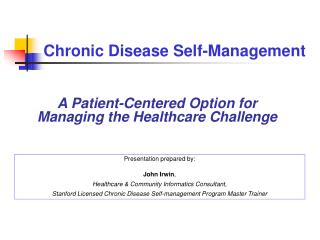
Chronic Disease Self-Management. A Patient-Centered Option for Managing the Healthcare Challenge. Presentation prepared by: John Irwin , Healthcare & Community Informatics Consultant, Stanford Licensed Chronic Disease Self-management Program Master Trainer. Today you will hear….
1.74k views • 29 slides
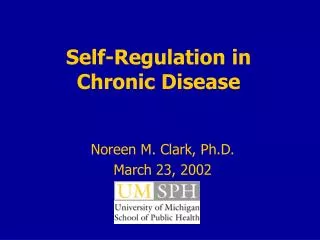
Self-Regulation in Chronic Disease. Noreen M. Clark, Ph.D. March 23, 2002. The day to day manager of chronic disease is the patient. Under best circumstance the physician provides guidelines for effective at home management.
750 views • 46 slides

Living Well with Chronic Conditions. Also known nationally as the Chronic Disease Self-Management Program - Developed by Stanford University - . Introductory Note. The Utah Approach to CDSMP and Diabetes Care : In no way is CDSMP to take the place of Diabetes Self-Management Education (DSME)
1k views • 70 slides
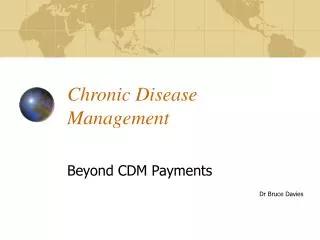
Chronic Disease Management . Beyond CDM Payments Dr Bruce Davies. Scope. What common diseases? Should they be formally managed? Frequency Importance Follow up affects outcome Know what to do Where is follow-up most appropriate?. Brainstorm.
313 views • 13 slides

Chronic Disease Self-Management. Does It work? Sharon Johnson M.S. Associate Professor Health and Human Sciences Oregon State University Extension Service . Do you have….
454 views • 21 slides
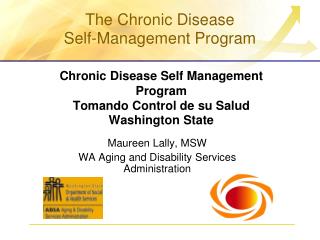
Chronic Disease Self Management Program Tomando Control de su Salud Washington State. Maureen Lally, MSW WA Aging and Disability Services Administration. The Chronic Disease Self-Management Program . My Goal Today .
297 views • 20 slides

Translation and Dissemination of the Evidence-based Chronic Disease Self-Management for Cancer Survivors Colorado CPCRN (with Texas A&M) Steering Committee Call, 2/15/2012. Background: Chronic Disease Self-Management Program (CDSMP).
509 views • 10 slides

Sponsored by The National Council on the Aging and CareSource. Healthy Aging Briefing Series. Chronic Disease Self-Management Program. WELCOME.
443 views • 24 slides

Presented at the 2014 Crossroads Conference: Navigating Health Care in West Texas June 4, 2014. Patient Navigator Program to Improve Chronic Disease Self Management. M. Christina R. Esperat , RN, PhD, FAAN , Professor and Associate Dean for Clinical Services, Texas Tech University Health
557 views • 43 slides
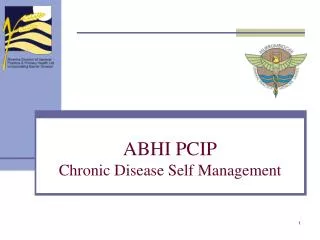
ABHI PCIP Chronic Disease Self Management. ‘A leading Division providing General Practice with quality innovative services that improve health outcomes for individuals and the community’. Objective. Presentation focused on:
343 views • 19 slides

Chronic disease management. Looking after people with long term conditions in General Practice. In trios …. Think of all the long term conditions GPs are involved in managing. Chronic diseases to be managed?. Cardiovascular - IHD, HT, heart failure, AF, peripheral vascular disease
518 views • 15 slides
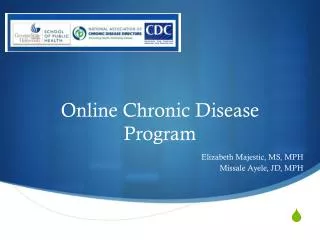
Online Chronic Disease Program. Elizabeth Majestic, MS, MPH Missale Ayele, JD, MPH. Agenda. Introduction Provide overview of program Demo the program website Q&A. Process. Analysis. Development/Delivery. Developed by experts in public health and academia
182 views • 8 slides
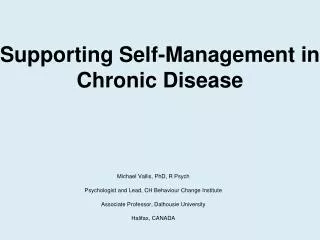
Supporting Self-Management in Chronic Disease. Michael Vallis, PhD, R Psych Psychologist and Lead, CH Behaviour Change Institute Associate Professor, Dalhousie University Halifax, CANADA. What, Me Judgmental?. What is the Standard of Care?. Dominant models of behaviour in health care
403 views • 21 slides

Chronic Disease Management. and the Expert Patients Programme. Level 3. Highly. Case. complex. Mgt. patients. Level. 2. Disease. High risk. Management. patients. Level 1. Self. 70-80% of a. Management. CDM pop. Chronic Disease Management.
736 views • 24 slides

Chronic Disease Self Management. Leigh Caplan, RN, MA, CDE, Diabetes Nurse Educator, Sunnybrook Academic Family Health Team Judith Manson, RN, BScN, NCMP, Executive Director, Sunnybrook Academic Family Health Team May 4, 2012. Learning Objectives.
736 views • 48 slides

Chronic Disease Self-Management Programs Take Control of Your Health & Better Choices, Better Health. New Jersey Department of Human Services. Training Goals.
333 views • 24 slides

Chronic Disease Self-Management. Does It work? Sharon Johnson M.S. Associate Professor Health and Human Sciences Oregon State University Extension Service. Do you have….
438 views • 21 slides

Chronic Disease Management. Beyond QoF Payments Dr Bruce Davies. Scope. What common diseases? Should they be formally managed? Frequency Importance Follow up affects outcome Know what to do Where is follow-up most appropriate?. Brainstorm.
254 views • 13 slides

Chronic Disease Self-Management Programs Take Control of Your Health & Better Choices, Better Health. New Jersey Department of Human Services. Training Goals.
253 views • 24 slides
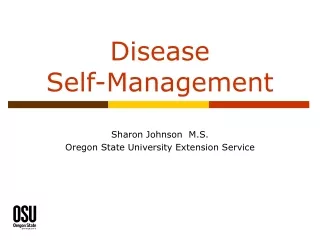
Disease Self-Management. Sharon Johnson M.S. Oregon State University Extension Service. “ The Silver Tsunami”. Increased life expectancy More older adults More chronic disease. More Chronic Disease…. 88% of people over sixty-five have one chronic condition Example :
122 views • 9 slides